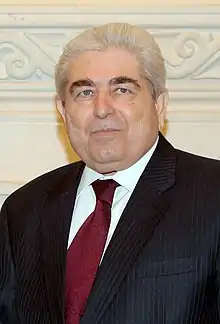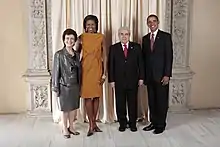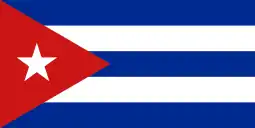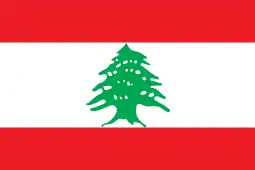Demetris Christofias
Demetris Christofias[lower-alpha 1] (Greek: Δημήτρης Χριστόφιας [ðiˈmitɾis xɾiˈstofças]; 29 August 1946 – 21 June 2019) was a Cypriot politician, who served President of Cyprus from 2008 to 2013. He was previously President of the House of Representatives from 2001 to 2008 and General Secretary of the Progressive Party of Working People from 1988 to 2009.
Demetris Christofias | |
|---|---|
Δημήτρης Χριστόφιας | |
 Christofias in 2011 | |
| 6th President of Cyprus | |
| In office 28 February 2008 – 28 February 2013 | |
| Preceded by | Tassos Papadopoulos |
| Succeeded by | Nicos Anastasiades |
| 9th President of the House of Representatives | |
| In office 7 June 2001 – 28 February 2008 | |
| Preceded by | Spyros Kyprianou |
| Succeeded by | Marios Garoyian |
| 4th General Secretary of the Progressive Party of Working People | |
| In office 22 April 1988 – 21 February 2009 | |
| Preceded by | Ezekias Papaioannou |
| Succeeded by | Andros Kyprianou |
| Personal details | |
| Born | 29 August 1946 Kato Dikomo, British Cyprus |
| Died | 21 June 2019 (aged 72) Nicosia, Cyprus |
| Political party | Progressive Party of Working People |
| Spouse |
Elsie Chiratou
(m. 1972) |
| Children | 3 |
| Signature |  |
Taking on the challenge of responding to the 2007-8 Global Financial Crisis, he implemented a popular and wide-ranging social program, increasing pensions and the minimum wage. At the end of his term, however, the local banking system collapsed. Putting blame on the banks, he attempted to raise taxes on them as a way of funding the island's recovery, but failed to pass this into legislation. Also citing deadlock in reunification talks, he announced that he would not seek re-election, becoming the first Cypriot leader to opt-out of running for a second term. He remains the only communist head of state in the history of both Cyprus and the European Union.
Early life
Demetris Christofias was born on 29 August 1946 in Kato Dikomo, British Cyprus, to a Greek Cypriot family.[1] He had a sister who once donated her kidney to him for a life-saving kidney transplant.[2] He received his high school education at Nicosia Commercial Lyceum, from which he graduated in 1964. He spent five years in Moscow, where he earned a PhD in history from the Russian Academy of Sciences.[2]
Career
Pre-presidential work

At the age of 14, Christofias joined PEOM, a progressive high school student organisation. At the age of 18, he joined PEO Trade Unions and the Progressive Party of Working People's youth branch United Democratic Youth Organisation. In 1969, at the 5th Congress of EDON, he was elected member of the Central Council.
In 1974 Christofias was elected to the post of the Central Organising Secretary of EDON and in 1977 to the post of General Secretary. He served in the latter post until 1987. In 1976 he was elected as a member of the Nicosia-Kyrenia District Committee of AKEL, and in 1982 – at the 15th Congress of AKEL – he was elected as a member of the Central Committee of the Party.
In July 1986, Christofias was elected as an alternate member of the Political Bureau of AKEL. After the 16th Congress of AKEL, held in November 1986, he was elected as a full member of the Political Bureau, and in 1987 (after terminating his service as General Secretary of EDON) he was elected as a member of the AKEL Secretariat. In April 1988, following the death of Ezekias Papaioannou, he was elected as General Secretary of AKEL, a post he held until 2009.
Christofias was elected as a Member of the House of Representatives for the first time in 1991 and was re-elected in the subsequent parliamentary elections of 1996 and 2001. On 7 June 2001, he was elected as President of the House of Representatives. He was re-elected as President of the House of Representatives in 2006. In his function as General Secretary of AKEL and President of the House of Representatives, he was a Member of the National Council, a supreme advisory body to the President of the Republic.
Christofias was ex-officio chairman of the House Standing Committee on Selection and chairman of the ad hoc House Standing Committee on Rules of Procedure and of the Special House Standing Committee on Declaration and Examination of Property. He was also president of the executive committees of the Cyprus group to the Inter-Parliamentary Union and of the Cyprus branch of the Commonwealth Parliamentary Association.
Presidency

The first round of the February 2008 presidential election, held on 17 February, saw a close result between the three leading candidates—Christofias, Ioannis Kasoulides of DISY, and the incumbent Tassos Papadopoulos—Christofias narrowly placing second with 33.3% of the vote, behind Kasoulidis with 33.5%. Christofias and Kasoulidis participated in a second round on 24 February,[3] for which Christofias received the backing of Papadopoulos's party DIKO.[4] Christofias went on to win the election with 53.37% of the vote.[5] After his success, he stated his support for the closure of Cyprus' British military bases[6] and pledged to restart talks to find a solution to the Cyprus problem. Addressing a crowd in Nicosia, he said he looked forward to "substantial cooperation for the benefit of both communities".[7][8]
Christofias was sworn in as president at a ceremony in the House of Representatives on 28 February 2008, vowing that "the solution of the Cyprus problem will be the top priority of [his] government".[9] Although he was proud to be a communist, he said he would leave the free market economy alone.[10] While much of the focus outside of Cyprus was on his communist background and education in Moscow, voters were more concerned with a solution to the Cyprus problem.[11]
Christofias appointed his government on 29 February 2008. His first government was a coalition between his own party AKEL, Marios Garoyian's Democratic Party and Yiannakis Omirou's Movement for Social Democracy. Christofias started talks with Mehmet Ali Talat on the reunification of Cyprus as a bizonal federal state,[12] but his hopes for Greek Cypriot approval of such a plan were soon scotched by the nationalists' victory in Northern Cyprus' 2009 parliamentary elections.[12]
.jpg.webp)
On 28 July 2011, Cyprus's cabinet tendered its resignation bowing to political and public pressure after a massive munitions blast at Evangelos Florakis Naval Base on 11 July 2011. Several thousand people upset by the Cypriot government's failure to dispose of the explosives had held a demonstration in the capital Nicosia on 12 July, demanding the resignation of Christofias.[13][14][15]
On 3 October 2011, the results of the investigation regarding the Evangelos Florakis Naval Base explosion were released to the public, placing the blame for the incident mainly on President Christofias, holding him “personally and institutionally responsible” for the blast.[16][17] Christofias rejected the results of the investigation and denied any personal responsibility for the tragedy.[18]
Six days later, the police report, "prepared by head of CID at police HQ", recommended the prosecution of 12 people; the police rejected claims they were trying to protect the Presidential palace officials with their report, instead asserting that the "police perform their duties “impartially and objectively”". The police also report that they "carefully avoided saying who and how many we propose to take to court, because the final word on who will be brought to justice rests with the AG...in no way did we want to stigmatise someone who the AG may later judge there is insufficient evidence to prosecute”.[19]
During this tenure as president, Christofias vowed to resume negotiations for the reunification of the island, making it one of the top priorities of his administration. Although his efforts did not lead to reunification, progress was made as ambulances and workers were able to cross the border, trade developed, and confidence-building measures were set in place.
He increased the minimum wage and pensions at the beginning of his term, but his social policy was stopped when the Cypriot banking system collapsed as a result of the 2012–2013 Cypriot financial crisis. The European Union then only agreed to grant an aid package in exchange for a policy of economic austerity, which Christofias never signed. He tried to limit the crisis with a €2.5 billion loan from Russia, while opposing the privatization scheme. He also found himself confronted in parliament, where his party held only one third of seats, with the majority of other politicians refusing his proposal to increase taxes on the banks responsible for the crisis.[20][21]'[22]
Christofias announced on 14 May 2012 he would not seek re-election for a second term in the next year, citing a deadlock in talks on the island's reunification.[23] He left office on 28 February 2013, following the presidential elections, and remains the only Cypriot president not to seek re-election.[24]
Personal life
Christofias met Elsie Chiratou while studying in Moscow, and they returned to Cyprus together before marrying in 1972.[2] They had a son named Christos and two daughters named Marianna and Christina.[2]
Christofias described himself as an atheist, which was unprecedented by a Cypriot political leader due to the island's overwhelmingly Greek Orthodox outlook.[25][26] In addition to his native Greek, he was fluent in English and Russian.[2]
Death
After experiencing acute respiratory problems, Christofias was hospitalised at Nicosia General Hospital on 20 May 2019.[27] He died on 21 June, aged 72. A period of national mourning was later announced, and a state funeral was held.[28][29]
Honours and awards
 Austria: Grand Decoration of Honour in Gold with Sash of the Decoration of Honour for Services to the Republic of Austria (10 May 2007)[30]
Austria: Grand Decoration of Honour in Gold with Sash of the Decoration of Honour for Services to the Republic of Austria (10 May 2007)[30] Russia: Medal of Pushkin (10 December 2007)[31]
Russia: Medal of Pushkin (10 December 2007)[31] Russia: Order of Friendship (30 August 2010)[32]
Russia: Order of Friendship (30 August 2010)[32] Russia: Jubilee Medal "70 Years of Victory in the Great Patriotic War 1941–1945" (31 May 2015)[33]
Russia: Jubilee Medal "70 Years of Victory in the Great Patriotic War 1941–1945" (31 May 2015)[33] Greece: Grand Collar of the Order of the Redeemer (2008)[34]
Greece: Grand Collar of the Order of the Redeemer (2008)[34]- Greek Orthodox Patriarchate of Alexandria: Knight Grand Cross of the Order of Saint Mark (9 April 2009)[35]
 Cuba: Order of José Martí (28 September 2009)[36]
Cuba: Order of José Martí (28 September 2009)[36].svg.png.webp) Holy See: Grand Collar of the Order of Pope Pius IX (2010)[37]
Holy See: Grand Collar of the Order of Pope Pius IX (2010)[37] Syria: Grand Collar of the Order of the Unity of the Nation (4 November 2010)[38]
Syria: Grand Collar of the Order of the Unity of the Nation (4 November 2010)[38] Ukraine: First Class of the Order of Prince Yaroslav the Wise (4 July 2011)[39]
Ukraine: First Class of the Order of Prince Yaroslav the Wise (4 July 2011)[39] Lebanon: Grand Cordon of the National Order of the Cedar (2012)[40]
Lebanon: Grand Cordon of the National Order of the Cedar (2012)[40].svg.png.webp) Sovereign Military Order of Malta: Order pro Merito Melitensi (25 October 2012)[41]
Sovereign Military Order of Malta: Order pro Merito Melitensi (25 October 2012)[41] Serbia: Grand Cross of the Order of the Republic of Serbia (30 January 2013)[42]
Serbia: Grand Cross of the Order of the Republic of Serbia (30 January 2013)[42]
Notes
- Sometimes spelled "Dimitris Christofias".
References
- "Christofias Demetris. Curriculum Vitae". President of Cyprus. Archived from the original on 5 April 2013. Retrieved 10 September 2020.
- Michele Kambas (24 February 2008). "FACTBOX — Five facts about Cyprus leftist Christofias". Reuters. Retrieved 10 September 2020.
- "Incumbent eliminated from Cyprus presidential election in major surprise". International Herald Tribune. Associated Press. 17 February 2008. Archived from the original on 15 December 2008.
- "Communist chief gains edge in Cyprus poll". AFP (news.com.au). 21 February 2008. Archived from the original on 16 January 2009. Retrieved 20 February 2008.
- "Presidential Election 2008: Run-off Election: Official results". Cypriot government. 24 February 2008. Archived from the original on 2 November 2007. Retrieved 24 February 2008.
- Helena Smith (25 February 2008). "Cyprus elects its first communist president". The Guardian. Retrieved 10 September 2020.
- "Christofias wins Cyprus presidency". CNN. 24 February 2008. Archived from the original on 29 February 2008. Retrieved 25 February 2008.
- "Christofias wins Cyprus presidential election". USA Today. 25 February 2008. Retrieved 17 December 2011.
- "New Cyprus president takes office with pledge for solution". Xinhua News Agency. 28 February 2008. Archived from the original on 3 March 2008.
- Kambas, Michele (24 February 2008). "Communist Christofias wins Cyprus presidential vote". Reuters. Retrieved 17 December 2011.
- Birch, Nicholas (25 February 2008). "Leftist victory revives hopes for a united Cyprus". The Independent. Retrieved 17 December 2011.
- "Cyprus country profile". BBC News. 27 May 2011. Archived from the original on 28 July 2011.
- "Cypriots Riot After Deadly Munitions Blast". Voice of America. United States Government. 12 July 2011. Retrieved 13 July 2011.
- Spencer, Richard (12 July 2011). "Anger grows in Cyprus over 'criminal errors' behind explosion". The Daily Telegraph. London. Retrieved 12 July 2011.
- Morley, Nathan (13 July 2011). "Anger Grows in Cyprus Over Munitions Blast". Voice of America. United States Government. Retrieved 13 July 2011.
- Kambas, Michele (3 October 2011). "Independent probe blames Cyprus leader for blast". Reuters.
- Mari probe: President is blamed for blast Archived 4 October 2011 at the Wayback Machine. Cyprus Mail (4 October 2011). Retrieved on 2011-12-17.
- "Cyprus president denies blame for munitions blast". Reuters. 3 October 2011.
- Outcry as ‘leaked report’ puts some blast responsibility on the dead Archived 12 November 2011 at the Wayback Machine. Cyprus Mail (9 October 2011). Retrieved on 2011-12-17.
- President Demetris Christofias has brought Cyprus to this sorry state. The Guardian (2012-19-12). Retrieved on 2013-18-03.
- Conservative Is Elected President in Cyprus The New York Times, 24 February 2013.
- After Negotiations, Cyprus Agrees to a Euro Zone Bailout PackageThe New York Times, 15 March 2013.
- Cyprus leader won't run for 2nd term
- Hadjicostis, Menelaos (21 June 2019). "Demetris Christofias, embattled former president of Cyprus, dies at 72". The Washington Post.
- Elias Hazou (17 September 2006). "Church elections: how it works". Cyprus Mail. Archived from the original on 6 June 2008. Retrieved 10 September 2020.
For instance, Chrysostomos might argue that certain self-declared atheists should not be allowed to vote. It's worth recalling that a couple of years ago, the leader of the communist party AKEL Demetris Christofias said he was an atheist.
- "Greek Cypriots elect new president". Bdnews24.com. 24 February 2008. Retrieved 10 September 2020.
Most of the campaign has focused on Christofias's credentials. His detractors have portrayed him as a die-hard communist who spurns his ethnic roots and has an allegedly atheist background
- Former President Christofias in ‘critical’ condition (Updated), cyprus-mail.com, 2019/05/31
- Psyllides, George (21 June 2019). "Former president Demetris Christofias has died". Cyprus Mail. Retrieved 21 June 2019.
- Hadjicostis, Menelaos (21 June 2019). "Demetris Christofias, embattled former president of Cyprus, dies at 72". The Washington Post. Retrieved 21 June 2019.
- 10542/AB XXIV. GP - Anfragebeantwortung, s. 1819
- "Указ Президента Российской Федерации от 06.12.2007 г. № 1634". kremlin.ru (in Russian). Президент России. 24 June 2020. Retrieved 8 February 2023.
- "Ο Πρόεδρος της Δημοκρατίας παρασημοφορήθηκε από τον Πρόεδρο της Ρωσικής Ομοσπονδίας". www.moi.gov.cy. Archived from the original on 4 March 2016. Retrieved 26 June 2019.
- Ριρής, Ανδρέας (29 May 2015). "Η Ρωσία τιμά τον τέως Πρόεδρο Δ. Χριστόφια". Dialogos. Archived from the original on 27 June 2019. Retrieved 27 June 2019.
- "Παράσημα και τη "ψυχή μας" έδωσε ο ΠτΔ στον Παυλόπουλο". www.sigmalive.com. 30 March 2015. Archived from the original on 16 July 2019. Retrieved 16 July 2019.
- "Πατριάρχης Αλεξανδρείας: Ο Χριστόφιας σφράγισε την ιστορία της Κύπρου". Philenews. Archived from the original on 26 June 2019. Retrieved 26 June 2019.
- "Story Map Tour". www.arcgis.com (in Spanish). 20 November 2017. Retrieved 8 February 2023.
- "President Anastasiades receives highest honorary distinction of the Holy See".
- "Ο Πρόεδρος της Δημοκρατίας συναντήθηκε με τον Πρόεδρο της Αραβικής Δημοκρατίας της Συρίας". www.mfa.gov.cy. Archived from the original on 27 June 2019. Retrieved 27 June 2019.
- "Про нагородження орденом князя Ярослава Мудрого" (in Ukrainian). 4 July 2011. Retrieved 8 February 2023.
- "Όλες οι τιμητικές διακρίσεις που δόθηκαν στον Δημήτρη Χριστόφια (Pics)".
- "The President of Cyprus in first State visit to the Order of Malta". Order of Malta. Archived from the original on 27 June 2019. Retrieved 27 June 2019.
- "Serbian, Cypriot leaders exchange state decorations". www.b92.net. 13 January 2013. Retrieved 8 February 2023.
External links
- Profile in House of Representatives web site at the Wayback Machine (archived 14 June 2008) (in Greek)